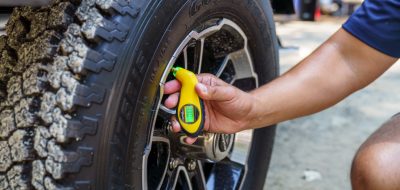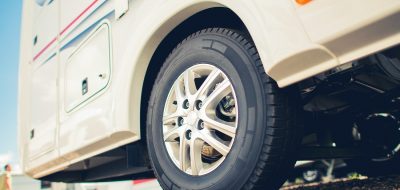 One of the most critical items on your RV is what supports it: the tires. It is very important that they are correctly sized, properly rated, aired up with the required pressure, and in good general condition. These things usually can be observed visually, except the air pressure. For this, you will need to use a pressure gauge to determine if they are correctly inflated.
One of the most critical items on your RV is what supports it: the tires. It is very important that they are correctly sized, properly rated, aired up with the required pressure, and in good general condition. These things usually can be observed visually, except the air pressure. For this, you will need to use a pressure gauge to determine if they are correctly inflated.
So, how often should you check the tire pressure? Well, though most would never do it, it should be done prior to hitting the road on each and every day.
The majority of tires on the road are inflated using normal compressed air. This air contains the same concentration of oxygen as we live in. Oxygen monticules are extremely small, so small they can pass through the rubber compounds of the tire over time. Therefore a pressure loss is inevitable. The temperature outside also alters the pressure from one day to the next.
Unlike an automobile, RVs can suffer major body damage should a blowout occur. This can amount to thousands of dollars in damage, not to mention becoming a dangerous safety issue. Even regular maintenance of the tire pressures may not prevent a blowout. The inside wheels of a dual set are nearly impossible to observe while driving. While travelling, you cannot feel a failed tire on your towed automobile behind the motor home.
Today, tire pressure monitors are a great solution for both the RV and dinghy. Not only do they display the P.S.I. of each tire, many also report the temperatures. Tire pressure monitors can pay for themselves and substantially increase the safety for all.
Constantly knowing the tire pressure can save on fuel consumption. Tires below their optimum pressure cause an increase in rolling resistance, which requires more fuel to cover the same distance. Additionally, tire temperatures can reveal other issues such as wheel alignment problems – again, another fuel waster. I experienced this first-hand. My right front tire was running about 19 degrees higher than the left. I replaced both tires thinking it was a tire issue. This did not change the readings. I then took it in for service and found it was out of alignment. Upon completion of the service, the temperature readings matched.
So, a tire monitor can help you reduce fuel consumption by alerting you to the need for additional air. It can save on excessive tire wear by alerting you of an alignment issue. And, if you ever experience an early warning alarm and avoid a rapid deflation or blowout while driving, it well may pay for your tire monitor instantly ten or more times over.
A tire monitor is a great option on any RV. In addition, RV owners should consider an affordable tire service option, like Good Sam Tire & Wheel Protection in the event you suffer a flat while on a trip. These services can save you on the typical costs of a flat and get you back on the road as quickly as possible.
Be safe and enjoy.







